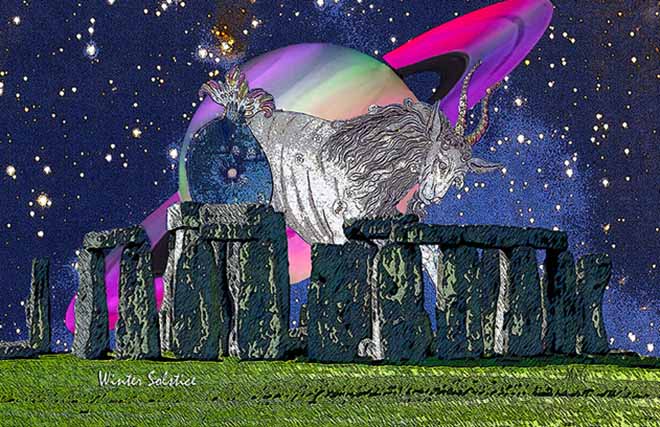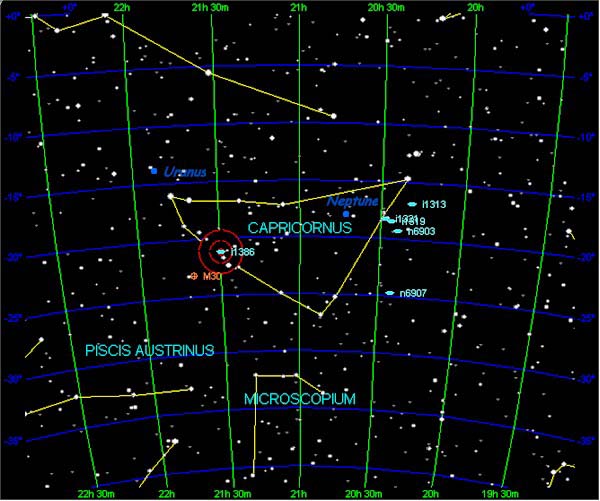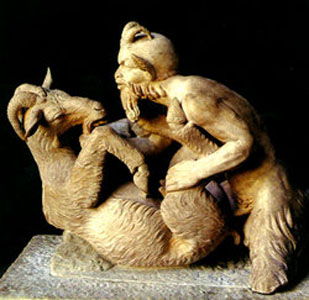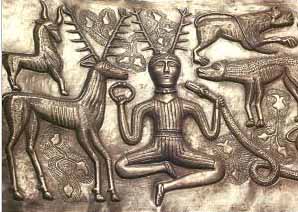
December 21/22 - January 20
Capricorn is an Earth Sign
Capricorn is Cardinal Sign

Capricorn is ruled by Saturn

December 21/22 - January 20
Capricorn is an Earth Sign
Capricorn is Cardinal Sign

Capricorn is ruled by Saturn

Capricorn is the tenth astrological sign in the Zodiac, originating from the constellation of Capricornus. It spans the 270-300th degree of the zodiac, between 270 and 305.25 degree of celestial longitude, which In the Tropical zodiac the Sun transits this area on average between December 22 to January 20 each year.
In astrology, Capricorn is considered an introvert sign, an earth sign, and one of the four cardinal signs. Capricorn is ruled by the planet Saturn. In Sidereal astrology, the sun currently transits the constellation of Capricorn from, approximately, January 15 - February 14.
Postive Traits:
Practical and prudent
Ambitious and disciplined
Patient and careful
Humorous and reserved
Negative Traits:
Pessimistic and fatalistic
Miserly and grudging
Over conventional and rigid
The Capricornian is one of the most stable and serious of the zodiacal types. These independent, rocklike characters have many sterling qualities, although admittedly some of these are as dull as they are worthy. This type is normally cautiously confident, strong willed and calm. Hardworking, unemotional, shrewd, practical, responsible, persevering they are capable of persisting for as long as is necessary they are reliable workers in almost any profession they undertake. But they are neither original nor creative and can only develop what others invent or initiate.
Within their limits, however, they are resourceful, determined managers, setting themselves and others high standards. Honest in their criticism of self, they respect discipline from above and demand it from those beneath them. In their slow, tough, stubborn, unyielding way they persist against boredom, frustration, and hardship to reach their objectives long after more brilliant and volatile subjects have given up. In fact when practical business ability allied with the drive of ambition and lust for power and wealth are required in employees to make a project succeed,
Capricornians are the people to hire. They plan carefully to fulfill their ambitions (which often include becoming wealthy), are economical without meanness and able to achieve great results with minimum effort and expense. Because of their organizing ability they are able to work on several projects simultaneously.
They love authority but may not be popular if they reach high rank, for, self-disciplined themselves, they expect their underlings to be equally so and to perform every task undertaken to the highest standard. They are, nevertheless, fair as well as demanding.
Among their equals they are not always the most pleasant of work fellows either, for they are reserved and too conservative, valuing tradition more than innovation, however valuable the latter, and they are often humorless. There is also a tendency to pessimism, melancholy and even surliness which many
Capricornians are unable to keep to themselves, especially if they fail personally or do not achieve the corporate success which they had planned for their firms. They can spread gloom and tension in their circle which depresses everyone around them. In the extreme this trait can make them manic-depressive, ecstatic happiness alternating with the most wretched kind of misery for no reason that the subject of these emotions can name.
The swings in mood are not the only reason Capricornians deserve the adjective based on their name - capricious. They can be surprisingly and suddenly witty and subtle for the dull, prosaic creatures they seem to be, and they also have a tendency to ruin everything earned by their caution and shrewdness by unexpected and utterly irresponsible bouts of flippancy. In individuals in whom the characteristic is strong, the temptation to do this has to be resisted with iron self-control. Another unexpected quality in some Capricornians is an interest in the occult which persists in spite of their naturally skeptical turn of mind.
Their intellects are sometimes very subtle. They think profoundly though with little originality, have good memories and an insatiable yet methodical desire for knowledge. They are rational, logical and clearheaded, have good concentration, delight in debate in which they can show off their cleverness by luring their adversaries into traps and confounding them with logic.
In their personal relationships they are often ill-at-ease, if not downright unhappy. They are self-centered, wary and suspicious of others, and in turn attract people who neither trust nor understand them. They prefer not to meddle with others nor to allow interference with themselves. Casual acquaintances they will treat with diplomacy, tact and, above all, reticence.
They make few good friends but are intensely loyal to those they do make, and they are bitter, revengeful enemies. They sometimes dislike the opposite sex and test the waters of affection gingerly before judging the temperature right for marriage. Once married, however, they are faithful, though inclined to jealousy. Family life, if well ordered as they like it to be, more than balances the goatlike inclination to lechery and inconstancy which some old authorities have ascribed to Capricorns.
Besides those already mentioned, faults to which the type is prone are over-conventionality, bigotry, selfishness, avarice and miserliness, chronic complaining, incessant unnecessary worrying, and severity spilling over into cruelty.
Their occupations can include most professions that have to do with maths or money and they are strongly attracted to music. They can be economists, financiers, bankers, speculators, contractors, managers and real estate brokers. They excel as bureaucrats, especially where projects demanding long-term planning and working are concerned, and their skill in debate and love of dialectic make them good politicians.
They are excellent teachers, especially as principals of educational establishments where they have the authority to manage and organize without too much intimacy with the staff members. If working with their hands, they can become practical scientists, engineers, farmers and builders. The wit and flippancy which is characteristic of certain Capricornians may make some turn to entertainment as a career.
Capricorn governs the knees, bones and skin, so its subjects may be liable to fractures and strains of the knees and other defects of the legs. Skin diseases from rashes and boils to leprosy (in countries where that disease is prevalent) are dangers, and digestive upsets may be caused by the Capricorn's tendency to worry or suppress emotions. Anaemia, Bright's disease, catarrh, deafness, rheumatism and rickets are also said to threaten the natives of this sign.

December 21/22 - Winter Solstice - Science Mythology, Celebrations

Capricornus, a name meaning Horned Goat in Latin, is one of the constellations of the zodiac. It is commonly called Capricorn, especially in astrology. It is commonly called the sea-goat, as it is in an area of the sky known as the Sea. Capricornus is one of the 88 modern constellations, and was also one of the 48 constellations listed by the 2nd century astronomer Ptolemy.
Under its modern boundaries it is bordered by Aquila, Sagittarius, Microscopium, Piscis Austrinus and Aquarius. The constellation is located in an area of sky called the Sea or the Water, consisting of many water-related constellations such as Aquarius, Pisces and Eridanus. It is the second faintest constellation in the zodiac after Cancer, and it is the smallest constellation in the zodiac.
The planet Neptune was discovered in Capricornus by German astronomer Johann Galle, near Deneb Algedi on September 23, 1846, which is appropriate as Capricornus can be seen best from Europe at 4:00am in September.
Due to the precession of the equinoxes the December solstice no longer takes place while the sun is in the constellation Capricornus, as it did until 130 BCE, but the astrological sign called Capricorn begins with the solstice. The solstice now takes place when the Sun is in Sagittarius. The sun's most southerly position, which is attained at the northern hemisphere's winter solstice, is now called the Tropic of Capricorn, a term which also applies to the line on the Earth at which the sun is directly overhead at noon on that solstice. The Sun is now in Capricorn from late January through mid-February.
Despite its faintness, Capricornus has one of the oldest mythological associations, having been consistently represented as a hybrid of a goat and a fish since the Middle Bronze Age. First attested in depictions on a cylinder-seal from around the 21st century BC, it was explicitly recorded in the Babylonian star catalogues as Mulsuhurmas "The Goat-Fish" before 1000 BC.
The constellation was a symbol of the god Ea. and in the Early Bronze Age marked the winter solstice. He has the lower half of a fish and the head and torso of a goat. The god lived in the ocean. He came out every day to watch over the land, and he returned to the sea every night.
The Egyptians and Chinese recognized the Age of Capricorn as the commencement of the much anticipated rainy season. Immediately following Capricorn are Aquarius, the Water Bearer, pouring moisture upon the Earth, and Pisces, the Fish, immersed in the unseen life-giving forces of water.
The Greek version of this legend above does not match with the physical description of the Seagoat. Greeks thought that the starry figure was Pan, a Greek demigod. Pan had the upper half of a man, but he had the legs of a goat. He was the son of Hermes and a forest nymph. According to legend, when the nymph saw her strange baby, she shrieked in fear and ran away.

Hermes, however, loved his strange son. He took him to Olympus, where the other gods and goddesses also took a liking to Pan. He became the god of shepherds and flocks, taking the responsibility from his father. He did not dwell on Olympus; he preferred to live among the shady trees in the mountains. He amused himself by playing his beloved reed pipes (known as Panpipes), or by chasing nymphs through the woods.
The God of the Wicca is the Horned God, the ancient God of Fertility: the God of forest, flock, and field and also of the hunt. He is Lord of Life, and the Giver of Life, yet He is also Lord of Death and Resurrection. For, like the Goddess, the nature of Her Horned Consort is also dual.

Horned Gods